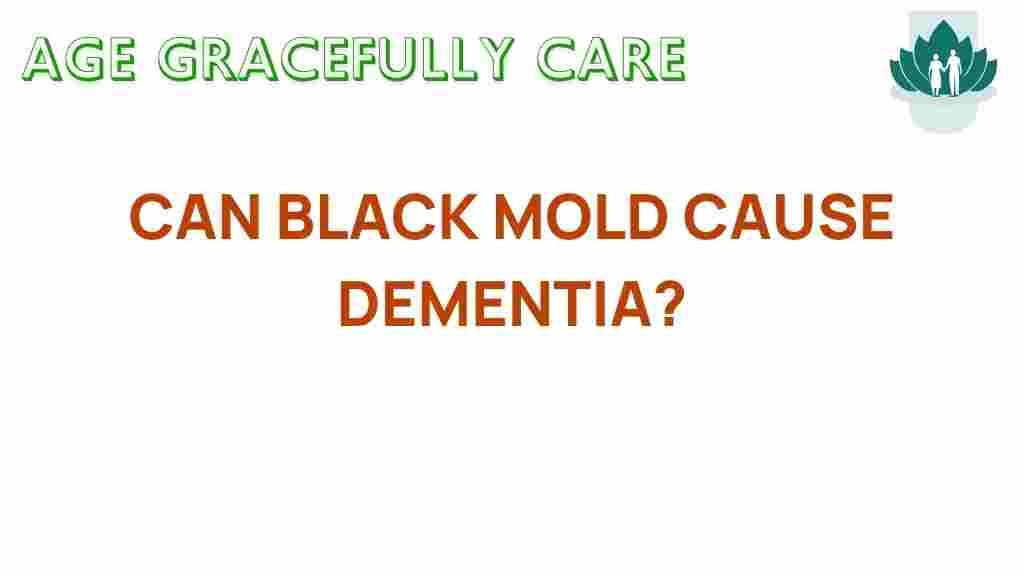Can Black Mold Be a Hidden Trigger for Dementia?
Black mold, scientifically known as Stachybotrys chartarum, is a type of mold that can grow in damp or humid environments. While mold is a common household issue, its potential health risks are often underestimated. Recent studies suggest that black mold may not only contribute to respiratory issues but could also be a hidden trigger for cognitive decline, including conditions like dementia. In this article, we will explore the connection between black mold, dementia, and overall health risks associated with mold exposure, and provide tips for prevention and improving indoor air quality.
Understanding Black Mold and Its Health Risks
Black mold thrives in moisture-rich environments, often found in areas such as bathrooms, kitchens, and basements. The health risks associated with black mold exposure are well-documented, including:
- Allergic reactions
- Respiratory problems
- Skin irritation
- Eye irritation
- Chronic fatigue
- Neurological effects
Among these health risks, the potential link between black mold and cognitive decline is particularly concerning. Mold exposure may lead to both short-term and long-term neurological effects, which can impact mental health and cognitive function.
The Link Between Mold Exposure and Cognitive Decline
Cognitive decline refers to the gradual loss of cognitive abilities, including memory, thinking skills, and problem-solving. While many factors contribute to cognitive decline, including age and genetics, environmental factors such as mold exposure may also play a significant role.
Research indicates that exposure to certain types of mold can produce mycotoxins, which are toxic compounds that may affect the brain. Some of the neurological effects associated with mycotoxins include:
- Memory loss
- Difficulty concentrating
- Confusion
- Changes in mood
- Decreased cognitive function
As the brain ages, it becomes more vulnerable to the adverse effects of environmental toxins, including those produced by black mold. In some cases, prolonged exposure to mold may exacerbate underlying conditions, leading to the development of dementia.
Assessing Indoor Air Quality
Indoor air quality is a crucial factor in maintaining overall health, particularly for individuals susceptible to cognitive decline. Poor air quality, often exacerbated by mold presence, can lead to various health issues. To assess your indoor air quality and its potential relationship with mold, consider the following steps:
- Check for visible mold growth in damp areas.
- Monitor humidity levels; ideally, indoor humidity should be between 30% and 50%.
- Use air purifiers with HEPA filters to reduce airborne mold spores.
- Ensure proper ventilation in areas prone to moisture.
- Conduct regular inspections and maintenance of plumbing and roofing to prevent leaks.
Preventing Black Mold Growth
Prevention is key to mitigating the health risks associated with black mold exposure. Here are some effective strategies to prevent mold growth in your home:
- Control Humidity: Use dehumidifiers in areas with high humidity and ensure good ventilation.
- Fix Leaks Promptly: Repair any leaks in roofs, walls, or plumbing to prevent moisture buildup.
- Use Mold-Resistant Products: Consider using mold-resistant paints and building materials in moisture-prone areas.
- Clean Regularly: Regular cleaning, especially in bathrooms and kitchens, can help prevent mold growth.
- Monitor Indoor Plants: Ensure that indoor plants are not overwatered, as excess moisture can promote mold growth.
Recognizing Symptoms of Mold Exposure
It is essential to recognize the symptoms of mold exposure early on, especially for those who may be at risk for cognitive decline. Common symptoms include:
- Nasal congestion
- Coughing or wheezing
- Fatigue
- Headaches
- Memory problems
- Changes in mood or behavior
If you or a loved one experiences these symptoms, especially in conjunction with known mold exposure, it is important to consult with a healthcare professional for further evaluation.
Troubleshooting Tips for Mold Issues
If you suspect that black mold is affecting your home, follow these troubleshooting tips to address the issue:
- Identify Sources of Moisture: Look for leaks, high humidity areas, and condensation points.
- Inspect and Clean: Clean any visible mold using appropriate cleaning solutions. Ensure you wear protective gear, including gloves and a mask.
- Consider Professional Help: If the mold issue is extensive, consider hiring a professional remediation service.
- Monitor Health Symptoms: Keep track of any health changes in yourself or family members and seek medical advice as needed.
Conclusion
In conclusion, black mold is not just an aesthetic concern but a potential health risk that may contribute to cognitive decline and dementia. Understanding the relationship between mold exposure and neurological effects is crucial for prevention and maintaining good mental health. By improving indoor air quality and taking proactive measures to prevent mold growth, you can protect yourself and your loved ones from the harmful effects of black mold.
For more information on mold and its health risks, you can visit the CDC’s mold page. If you’re looking for tips on improving indoor air quality, check out this helpful guide.
This article is in the category Health and created by AgeGracefullyCare Team
